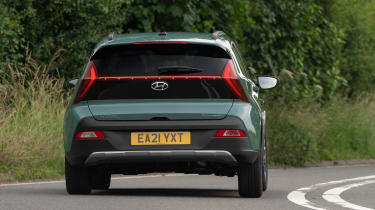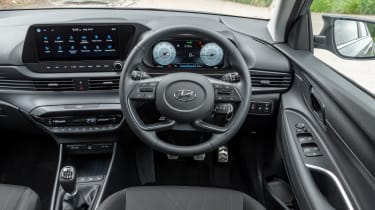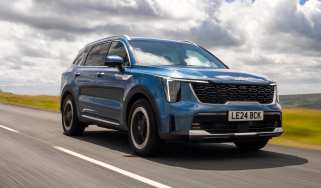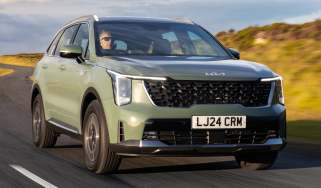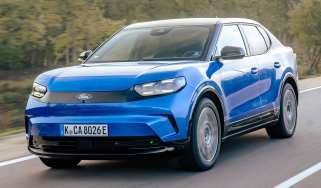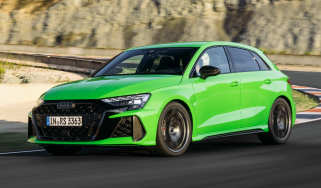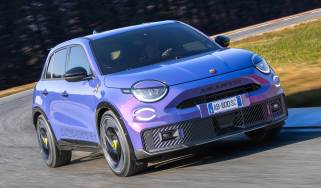New Hyundai Bayon 2021 review
The Hyundai Bayon sits at the bottom of the Korean firm's extensive SUV range, can it challenge in the competitive crossover segment?
Verdict
The new Hyundai Bayon feels like a small SUV that’s bang on target. It nails its brief of being practical, it’s well equipped, packed with features, comfortable and easy to drive - and it even arrives with value on its side. All this while making a splash with those looks. It’s not a small SUV with premium pretensions to take on the VW T-Cross nor does it trouble the Ford Puma for driving honours, but as a no-frills offering, and an alternative for the Skoda Kamiq, it feels an appealing package.
This is the new Hyundai Bayon - a supermini sized SUV based on the latest i20, and it’s a funny looking thing, don't you think?
Forgive us for interjecting with personal opinion on what is a subjective matter, but few will take a glance at this new SEAT Arona rival without recognising that that Bayon is an odd looking thing in a class of car that’s typically uber-conventional.
Alongside straight laced rivals such as the Volkswagen T-Cross and the Kia Stonic, its front end with split front headlights and ultra slim running lights, the angular side surfacing and large C-pillar, and the zig-zag profile of the tailgate are suitably space age. From the outside, it’s a world away from the i20 with which it shares its platform.
More reviews
Car group tests
In-depth reviews
In regards to positioning, the Bayon is intended to be a more practical small SUV compared with the Kona. It’s shorter and slimmer, but it is a fraction taller and packs a marginally larger boot.
However, while the Kona is offered with an all-electric version that will soon be joined by a sporty Kona N with up to 286bhp, the Bayon line-up is far more straightforward. All versions are powered by a turbocharged 1.0-litre three-cylinder petrol engine with 48-volt mild-hybrid assistance. 99bhp or 118bhp versions of this engine are available, with a six-speed manual gearbox standard fit, and a seven-speed dual clutch automatic optional.
The trim line-up follows Hyundai’s established order as well. Prices start from £20,295 for the car in SE Connect trim with 16-inch wheels, automatic headlights with high beam assist, cruise control, rear parking sensors, 10.25-inch digital instruments and an eight-inch central touchscreen display with smartphone mirroring apps.
Premium models, as driven here, take up the middle spot in the line-up. 17-inch wheels arrive alongside tinted windows and LED headlights as does a larger 10.25-inch touchscreen and luxuries such as automatic air conditioning and a heated steering wheel. The line-up is completed by the Ultimate trim models, with further visual enhancements and luxuries such as a stereo system from Bose.
Climb inside the Bayon and you’ll notice that in contrast to the unique exterior design, it shares much of its interior with the i20. Plenty of hard black plastics are used around the cabin at arm’s height, on the doors and across the sweeping dashboard, so quality doesn’t step beyond the level of the i20. It’s not as appealing to the touch as the Volkswagen T-Cross, nor does it have a design that dazzles like the Peugeot 2008’s.
A leather trimmed wheel is standard on all models and the infotainment package is very strong as well. The 10.25-inch display is huge for a car of this size, and it’s quick to operate with simple menus and sharp graphics.
There’s a usefully sized glovebox, large door bins and a small storage space beneath the climate control functions that can accommodate a wireless charging pad for smartphones. The central storage space between the front seats is quite small though, and space up front does feel ever so slightly cramped and narrow. It’s better in the rear, where strong legroom means that two adults shouldn’t have too many gripes about sitting back there for a while.
The rear bench features a small third seat and splits 60/40 when folding down. The 334-litre boot is good but the 1,205 litres of space with the rear bench folded is more impressive. The Bayon’s focus on practicality means that the tailgate opens wide for easy access, too. Plus, there’s an adjustable boot floor that can be configured to sit flush with the loading edge.
Sticking true to the car’s user-friendly image, there’s little about the way the Bayon drives to set pulses racing. The 1.0-litre turbocharged mild-hybrid engine is a strong point. The 118bhp version on our car pulled strongly with adequate performance for an SUV of this size and price, and with good refinement too. The regeneration feeding power back to the 48-volt system isn’t too intrusive either - you’ll only really detect the car slowing at a slightly faster rate than it would when naturally coasting if you really concentrate.
The controls are exceptionally light across the board. The small diameter wheel is free of any feedback but it’s direct enough. A fraction of additional weight can be added by toggling the somewhat out of place Sport mode on the drive mode select button by the gearstick.
The gearbox offers a short throw shifting action but it’s not the most pleasing to rifle through the gears with. It’s joined by a clutch pedal that’s exceptionally light as well, owing to there being no mechanical link between it and the clutch itself. It’s Hyundai’s new iMT eClutch system, using the 48-volt electric loop to operate the clutch by wire.
It’s a car that takes a little getting used to, but once you’re on board with it, few small SUVs are quite as untaxing to drive as the Bayon, especially as it comes with well rounded ride quality too.
The Bayon comes with peace of mind as well. Alongside the relaxing driving experience should be a relaxing ownership experience, thanks to a standard five-year, unlimited mileage warranty. And for Premium trim cars up, a five-year subscription to Hyundai’s Bluelink telematics service, meaning vehicle functions can be operated and prepared remotely via a smartphone companion app, is standard.
| Model: | Hyundai Bayon Premium 1.0 T-GDi 120PS 48v |
| Price: | £23,745 |
| Engine: | 1.0-litre 3cyl turbo petrol MHEV |
| Power/torque: | 118bhp/172Nm |
| Transmission: | Six-speed manual gearbox, front-wheel drive |
| 0-62mph: | 10.4 seconds |
| Top speed: | 115mph |
| CO2: | 121g/km (est) |
| On sale: | Now |


